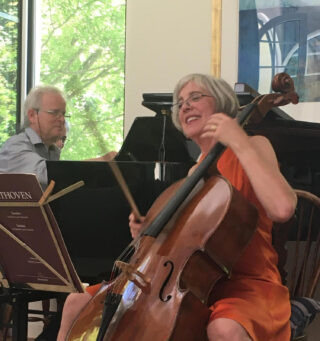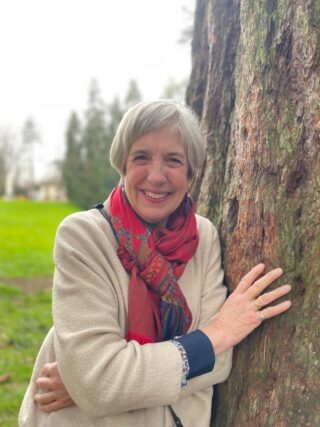Let's Talk About Rebooting Education
05 Nov
In May, we launched #RebootingEducation, a conversation to find out how COVID-19 is changing our ideas about education and to explore what it means for the future.
As schools went back this autumn, we collaborated with Development Education Centre South Yorkshire (DECSY), Global Learning London and the Our Shared World coalition on a new video bringing together parents, teachers and children to ask some big questions.
Here we interview Clive Belgeonne and Alia Alzougbi, from DECSY and Global Learning London, about the importance of talking about rebooting education.
Hi Clive and Alia, thanks for talking to us today. Will you tell us a little bit about your organisations and your work in education?
Clive: We’re DECSY, part of a network of development centres around the country. We want to inspire teachers to bring a more global perspective into their teaching, and to help young people develop the knowledge, skills and values that will enable them to work towards a more sustainable future.
Alia: We’re Global Learning London, part of the same network of development centres as DECSY. We work with young people, teachers and their wider communities to explore how deeply interdependent we are on each other and on the Earth, and what action we can take toward a more just and sustainable world.
Firstly, how do you think COVID-19 has led to parents and carers becoming more engaged in the conversation around education?
Clive: We are in a moment where people have had their ‘normal’ lives interrupted, and parents and carers doing home-schooling have become much more involved in their children's education. Obviously a lot of parents aren't teachers, so it's a challenge to take over teaching your children elements of the national curriculum.
Alia: Home-schooling revealed that some parents were struggling to teach the curriculum, firstly because teaching is a highly-skilled, highly-demanding profession but also because the knowledge base of many of our parents, who are first second, or third generation migrants, is different. The curriculum does not make space for these alternative forms of knowledge -- the art of conversation, the soothing balm of nature, the ability to work with the soil to draw food and nourishment, the connection to an inner source of individual strength and collective resilience. These are not only skills, but ways of inhabiting the world that many of us have lost and would do well to regain.
Clive: Lockdown also coincided with better weather and parents felt challenged sitting inside with their children, going through the school curriculum, when they could perhaps be learning outside and learning in other ways. I think quite a few parents found the curriculum narrow and limiting. Some of them started to question, what is this stuff they're having to learn? Look at what's happening in the world at the moment?
Apart from the disruption of Covid, things like the school strike for climate and then Black Lives Matter were very much in the news. Parents and carers were interested in these initiatives and seeing how the education system was going to respond to them. I thought that it was a good moment to say, there are lots of things leading us to the question of what sort of education is relevant for young people's future, so let’s get involved in the discussion.
Alia: Parents have such an important role in re-imaging how schools could fulfil their potential.
Tell us about the people who feature in the rebooting education video, and why you wanted to include them in the conversation.
Alia: We are deeply connected to our community and were already facilitating conversations in forums engaging young people, teachers, and parents and carers. The idea for the video dove-tailed with these conversations and a deep desire to come together to make sense of it all.
With the outbreak of the pandemic and with the Black Lives Matter movement resurging into the public imagination, we felt that we had to stop and to listen radically, intently and deeply to the young people, the teachers, the parents and carers we work with.
Clive: It felt like an important moment to promote a bigger discussion about what sort of education is needed for our uncertain and changing future. So far, this discussion has been happening, but mainly in the NGO sector and with teaching unions; the wider community of parents and carers has not always been so actively involved. This was an opportunity to put out a series of questions that would hopefully make them want to get involved in the conversation.
Alia: There is no question that COVID has had a disproportionate impact on racialised communities (communities of colour), those with disabilities and those from lower socio-economic backgrounds. In inner-city London, overwhelmingly the staff body does not reflect the student body, so even with the best will and expertise in the world, it is inevitable that there will be some form of disconnect between what children need and what schools are able to deliver. In our experience, involving parents in the conversation goes a long and solid way to bridging the disconnect within the school community to a level of exchange that is mutually beneficial and satisfying.
What do you think is the biggest change that needs to happen for young people to create a more compassionate and sustainable future?
Clive: Quite a lot of schools feel constrained by the national curriculum. We need to cover areas in the national curriculum, but let's make sure that we enhance it so that it's actually relevant and useful for the young people that we're educating. With Covid, people are talking about the notion of a recovery curriculum with a much bigger focus on mental health and wellbeing. I think that could be expanded to look at the wellbeing of people and the planet.
Alia: A big issue COVID 19 has uncovered is the deep socio-economic inequality in our society and central to this question is the role of education in perpetuating this inequality. We all know of research demonstrating that more equal societies are happier societies, and we know the connection between wellbeing and nature. These issues are all connected to one another and we are strong believers that we cannot talk about one without talking about the other: social inequality along economic and/or racial lines, environmental sustainability, and compassionate co-existence with each other and the Earth are all deeply inter-linked. What do schools need to be hubs of creativity and re-imagination to help us face the urgent challenges being thrown our way?
Do you think there’s appetite for change amongst teachers?
Clive: When you talk to teachers away from the whiteboard, they're not very happy with the situation. But I think at this very moment, it's difficult for them to be involved in anything more than just keeping things together, which is why I think it’s probably more useful to aim the conversation at the constituency of parents and carers at this very moment. Hopefully the conversation will continue developing, and when they can, teachers will say, yes, let's get involved.
Alia: Definitely. We only need to see recent interviews with the poet Caleb Femi, who had a passion for teaching but made the decision to leave when he saw how narrow and restrictive the curriculum was. We have met many Caleb Femis along the way.
Can you tell us about a positive change you’ve seen in the last six months, which you would like to see maintained in the future?
Clive: I think, in most neighbourhoods I've seen people looking out for each other much more, checking up on each other. I think people have also slowed down a bit and begun to question - what's it all about? I think that's very positive. Hopefully this idea of actually caring more for your neighbours and their wellbeing and wanting to connect as a community, many people will want to maintain.
Alia: We’ve seen a significant rise in demand for our provision for schools around anti-racism -- training for teachers, workshops for children, and dialoguing spaces for parents and staff. We’re taking the opportunity to ensure the connection between the social and environmental justice remains at the centre of the conversation. Because it is not enough to talk about racial and other social injustices as stand-alone phenomena. We need to keep digging at the roots.
If people want to get involved in the #RebootingEducation conversation, what would you encourage them to do?
Clive: In the first instance, we hope people will watch the video, and then share it with their friends and family, and with their children. Quite often parents are not fully aware of what exactly schooling entails so they can perhaps ask some of the questions from the video, and involve their children in that discussion. Hopefully they will come to the Rebooting Education page, look at some of the short videos people have posted, and maybe be inspired to post something themselves. You could also write to any educational institution such as your school or LEA, to ask them to think about what they are doing to make education relevant to young people’s futures.
Alia: Join the conversation!
- Go to Reboot the Future’s Global Dimension website to incorporate global learning into your teaching -- there is a wealth of resources that align with the curriculum while widening it.
- Enrich the conversation at school by drawing in the diverse worldviews of parents and carers to hold dialoguing spaces of public participation.
- Ask and listen to young people’s perspectives, and amplify them within the school grounds and beyond.
- In creating dialoguing and listening spaces with parents and pupils, use the questions from the video to provoke conversations, and be sure to keep these spaces curious, open and democratic.
- As part of Our Shared World, we are also seeking feedback on our Cultural Learning rationale and road map -- please get in touch with me at alia.alzougbi@towerhamlets.gov.uk to give us your thoughts. We want to hear from you.
- And listen -- listen deeply, radically and intently. Because impactful action is fueled by quiet inner work, introspection and value excavation first.
To find out more about the #RebootingEducation conversation and to share your views, please go to: https://www.rebootthefuture.org/rebootingeducation. You can also sign-up to our website Global Dimension which provides thousands of free teaching resources on global issues here (updated website coming in January!).
Alia Alzougbi is an educationalist, storyteller and cultural producer. She is a Clore Fellow and a Fellow of the Royal Society of Arts and was, until recently, among the core teaching staff at the British Museum. An accredited Philosophy for Children practitioner and Relational Dynamics Coach, she volunteers as a coach with young people both nationally and internationally. She is Head of Global Learning London (www.globallearninglondon.org).
Clive Belgeonne is an Education Advisor at DECSY (Development Education Centre, South Yorkshire) and a Team Leader for CCGL (Connecting Classrooms through Global Learning). He is a SAPERE trainer in P4C (Philosophy for Children) and a qualified ‘Global Trainer’ who has facilitated training in Europe and Asia. He is also Course Leader for the PGCE in Citizenship & PHSE at Sheffield Hallam University. A former secondary school teacher and a primary school governor for over 25 years, he is a Founding Fellow of the Chartered College of Teaching.


